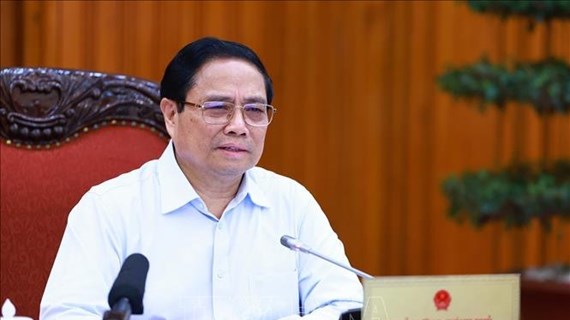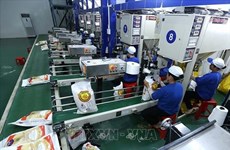Sacrifice of fallen combatants remembered
Participants found it a worthwhile
experience being part of an event to commemorate those who laid down
their lives for national freedom and peace at one of the country’s
fiercest battlefields during the US war.
Participants found it a worthwhile
experience being part of an event to commemorate those who laid down
their lives for national freedom and peace at one of the country’s
fiercest battlefields during the US war.
Being involved in the programme, called “War Memories and a Desire for Peace” in central Quang Tri province, from July 24-26, made a strong impression on 20-year-old Duong Thi Nhu Hoa, an overseas Vietnamese from Belgium, who said “I am proud of Vietnamese history.”
Hoa, who since leaving Vietnam at the age of three has visited the homeland five times, was among more than 100 young overseas Vietnamese who returned for the 2009 summer camp and participated in the programme.
The event included a requiem to pray for peace for the souls of the fallen soldiers at the Road No. 9 Cemetery and a ceremony to inaugurate a wharf to drop flowers in the Thach Han River, as well as a cultural exchange, the screening of documentary films and a meeting with veterans who fought on the Quang Tri battlefield.
“At the age of 20, we are enjoying the most wonderful moments of our youth, while those who were at our same age 62 years ago sacrificed their youth for the fight for national independence and unification,” Hoa said.
“I am so proud of the dauntless courage as well as boundless sacrifices that the Vietnamese people have made for the nation’s peace,” the youth noted, expressing her wish “to do something” for the homeland.
Home to 72 cemeteries where over 60,000 soldiers from all corners of the country rest in peace, Quang Tri province has long been at the heart of activities commemoratively honouring those who rendered great service to the nation.
So far authorities have been unable to provide a full account of those who laid down their lives in Quang Tri. Some documents have revealed that as many as 15,000 combatants are likely to have fallen at the Quang Tri Old Citadel alone, where the most barbarous fights of the war took place. However, a mere 1,000 or so remains were put in graves, with almost all of them remaining unidentified.
The fierceness of the war has, seemingly, never faded in the memories of those who were lucky enough to survive.
Colonel Trinh Ngu, former commander of battalion No. 1, regime 9, division 304, which was the first to enter Quang Tri’s Old Citadel on April 30, 1972, recalled that “grenades exploded everywhere, when we stepped over the door, when we opened drawers, or even when we moved tables.”
However, the colonel was indeed proud that the sacrifices of those soldiers at the Quang Tri Old Citadel greatly contributed to the nation’s efforts to secure the Paris Agreement in 1973 and win national victory on April 30, 1975 – a victory that earned the world’s admiration.
Speaking at the requiem for the fallen, the Algerian Ambassador to Vietnam commented that their blood was shed not only for Vietnam ’s independence, but also for the freedom of all oppressed people all over the world.
Deputy Ambassador of Panama , Xiomara Perez agreed that the combatants made great sacrifices for the country to revive.
Such sacrifices served as a solid bedrock for the country to develop and integrate into the world. But for this to happen, the contributions of young overseas Vietnamese like Duong Thi Nhu Hoa, or Thuy Dung from the Czech Republic are vital. The two youths spoke of their desire to prove “the Vietnamese people’s intellect to the world”.
The programme, “War Memories and a Desire for Peace”, was held by the General Political Department of the Vietnam People’s Army in coordination with the State Committee for Overseas Vietnamese and Quang Tri provincial authorities./.
Being involved in the programme, called “War Memories and a Desire for Peace” in central Quang Tri province, from July 24-26, made a strong impression on 20-year-old Duong Thi Nhu Hoa, an overseas Vietnamese from Belgium, who said “I am proud of Vietnamese history.”
Hoa, who since leaving Vietnam at the age of three has visited the homeland five times, was among more than 100 young overseas Vietnamese who returned for the 2009 summer camp and participated in the programme.
The event included a requiem to pray for peace for the souls of the fallen soldiers at the Road No. 9 Cemetery and a ceremony to inaugurate a wharf to drop flowers in the Thach Han River, as well as a cultural exchange, the screening of documentary films and a meeting with veterans who fought on the Quang Tri battlefield.
“At the age of 20, we are enjoying the most wonderful moments of our youth, while those who were at our same age 62 years ago sacrificed their youth for the fight for national independence and unification,” Hoa said.
“I am so proud of the dauntless courage as well as boundless sacrifices that the Vietnamese people have made for the nation’s peace,” the youth noted, expressing her wish “to do something” for the homeland.
Home to 72 cemeteries where over 60,000 soldiers from all corners of the country rest in peace, Quang Tri province has long been at the heart of activities commemoratively honouring those who rendered great service to the nation.
So far authorities have been unable to provide a full account of those who laid down their lives in Quang Tri. Some documents have revealed that as many as 15,000 combatants are likely to have fallen at the Quang Tri Old Citadel alone, where the most barbarous fights of the war took place. However, a mere 1,000 or so remains were put in graves, with almost all of them remaining unidentified.
The fierceness of the war has, seemingly, never faded in the memories of those who were lucky enough to survive.
Colonel Trinh Ngu, former commander of battalion No. 1, regime 9, division 304, which was the first to enter Quang Tri’s Old Citadel on April 30, 1972, recalled that “grenades exploded everywhere, when we stepped over the door, when we opened drawers, or even when we moved tables.”
However, the colonel was indeed proud that the sacrifices of those soldiers at the Quang Tri Old Citadel greatly contributed to the nation’s efforts to secure the Paris Agreement in 1973 and win national victory on April 30, 1975 – a victory that earned the world’s admiration.
Speaking at the requiem for the fallen, the Algerian Ambassador to Vietnam commented that their blood was shed not only for Vietnam ’s independence, but also for the freedom of all oppressed people all over the world.
Deputy Ambassador of Panama , Xiomara Perez agreed that the combatants made great sacrifices for the country to revive.
Such sacrifices served as a solid bedrock for the country to develop and integrate into the world. But for this to happen, the contributions of young overseas Vietnamese like Duong Thi Nhu Hoa, or Thuy Dung from the Czech Republic are vital. The two youths spoke of their desire to prove “the Vietnamese people’s intellect to the world”.
The programme, “War Memories and a Desire for Peace”, was held by the General Political Department of the Vietnam People’s Army in coordination with the State Committee for Overseas Vietnamese and Quang Tri provincial authorities./.












